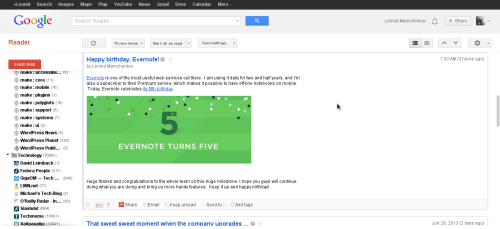Mashable reminds us that it’s been a year since Google Reader has been decommissioned. They are also doing a survey to find out if people use more of RSS feeds now or less, what they’ve substituted it with and which tools people are using now to follow their favorite feeds.
I’ve completed the survey, but without any visible results just yet, I thought I’d talk about my situation here. In the last year my use of RSS has decreased significantly. Even though the actual number of the feeds I am subscribed to has increased, I read them less. I share less. I bookmark and blog about less. And it’ nothing but the tool’s fault. Even though Feedly is an excellent tool – fast, flexible, with mobile support, and aesthetically pleasing, it simply is not Google Reader, which I was practically embed into. I’ve looked around for Google Reader alternatives, I tried a few. Feedly is the best of the bunch for my taste, but it’s different.
So, with that in mind, what happened to all that free time that I used to spend in Google Reader? Sadly, I have to admit that I’m much more on Facebook now. Quality-wise, that’s a huge drop. Instead of following my favorite writers, keeping in touch with all kinds of technology advances, and learning new things, I am now participating in flaming comment wars about nothing, and watching videos of cute kittens and bouncing boobs. Cheap entertainment swallowed me and spat me out. It’s exactly like never switching a television set was in the last century. And it’s a pity.
And the saddest part is that I knew it would happen. And if I knew, Google definitely knew that too. And they killed Google Reader anyway. And it’ll be a long time until I let it go…
